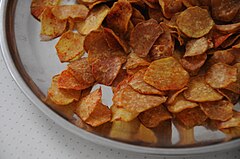Tapioca chip
 From Wikipedia - Reading time: 8 min
From Wikipedia - Reading time: 8 min

Tapioca chips are a snack food made from thin wafers of deep-fried cassava root. It is commonly found in South India, and Sri Lanka, as well as in Indonesia where it is known as kripik singkong (cassava chips), and in Malaysia known as 'kerepek ubi'.
It is also a bulk commodity product that is produced and traded, and in this form is used to create products such as alcohol, animal feed, biofuel, and starch.
Overview
[edit]The dish is prepared using raw cassava tubers, whereby the inner rind and outer skin are removed.[1] The chips are then fried or deep-fried in coconut oil, salted, and often spiced with red chili powder.
Tapioca chips have a longer shelf life compared to raw cassava tubers.[2] The snack is sometimes purveyed and consumed as a street food.[3]
Some companies mass-produce and purvey prepared tapioca chips that are packaged in bags.[4]
Variations
[edit]India and Sri Lanka
[edit]

The snack is widely available in Tamil Nadu,[3] Kerala,[2] Karnataka, and Sri Lanka. High in carbohydrates, it is a crunchy and flavorful snack food, and the chips are crunchier compared to banana chips and potato chips. Common variants include the non-spicy and spicy (red chili pepper powder[5] and other spices added).
Indonesia
[edit]
Thinly sliced cassava is deep fried to be made as kripik singkong crackers (cassava chips or tapioca chips).[6] Next to potato chips, cassava chips are a popular snack in Indonesia and are often spiced with various flavors. Some are mass-produced and purveyed under various brand names in stores and supermarkets.[7]
A variant of hot and spicy kripik singkong coated with sugar and chili pepper is known as kripik balado[8] or keripik sanjay, a specialty of Bukittinggi city in West Sumatra.
Commercial tapioca chips
[edit]Tapioca chips and pellets are also produced, sold, and traded in bulk as a commodity, and are used to make starch, alcohol, and biofuel.[9][10][11] The product is also used as animal feed in Kerala and Madras, India, and for this purpose, processing typically involves only the removal of the outer skin of the tubers.[1] Commercial varieties typically consist of the sliced and dried cassava tuber and are not fried in oil.[12]
See also
[edit]References
[edit]- ^ a b Subhaschandran, D.V. (1969). A Text Book on Animal Nutrition: For the Use of Veterinary Faculty Members, Graduates, and Post-graduates in Veterinary Colleges. Krishna Subaschandran. Retrieved January 27, 2018.
- ^ a b Ninan, K.N. (1986). Cereal Substitutes in a Developing Economy: A Study of Tapioca, Kerala State. Concept Publishing Company. p. 215. Retrieved January 27, 2018.
- ^ a b Philip, Susan Joe (December 22, 2017). "Humans of Coimbatore- Roadside Food Vendors". The Hindu. Retrieved January 27, 2018.
- ^ Snack Food. Harcourt Brace Jovanovich Publications. 1991. p. 42. Retrieved January 27, 2018.
- ^ Sripathi, Apoorva (September 24, 2015). "Relish the local flavour". The Hindu. Retrieved February 2, 2018.
- ^ "Resep Homemade Keripik Singkong (Cassava Chips) oleh Intan Nastiti". Cookpad (in Indonesian). Retrieved 2018-01-27.
- ^ "Kusuka Cassava Chips". Kusuka.
- ^ "Warga Australia Pun Belajar Membuat Keripik Balado". www.radioaustralia.net.au (in Indonesian). Retrieved 2018-01-27.
- ^ "China seen facing tapioca shortage for ethanol". U.S. January 21, 2008. Retrieved January 27, 2018.
- ^ Cassava in Asia, Its Potential and Research Development Needs: Proceedings of a Regional Workshop Held in Bangkok, Thailand, 5-8 June, 1984. CIAT. 1986. p. 134. ISBN 978-84-89206-48-9. Retrieved January 27, 2018.
- ^ Bradlow, D.D.; Finkelstein, J.G. (2014). Negotiating Business Transactions: An Extended Simulation Course. Aspen Coursebook Series. Wolters Kluwer Law & Business. p. 74. ISBN 978-1-4548-3838-8. Retrieved January 27, 2018.
- ^ Cassava in Tropical Africa: A Reference Manual. International Institute of Tropical Agriculture. 1990. p. 108. ISBN 978-978-131-041-6. Retrieved January 27, 2018.
Further reading
[edit]- Whitworth, Joseph Janes (October 24, 2014). "Hydrocyanic acid forces recall of Tapioca chips". Food Quality News. Retrieved January 27, 2018.
External links
[edit] Media related to Tapioca chips at Wikimedia Commons
Media related to Tapioca chips at Wikimedia Commons- "Manioc, a Sri Lankan all Time Favourite". Ankierenique.wordpress.com. 29 April 2012.
 KSF
KSF